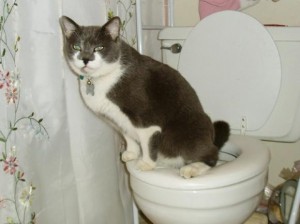Prevent Bathroom Disasters: Don't Flush Cat Poop Down Your Toilet - Expert Guidance
Prevent Bathroom Disasters: Don't Flush Cat Poop Down Your Toilet - Expert Guidance
Blog Article
Have you been in search of help concerning Don’t flush cat feces down the toilet?

Introduction
As feline proprietors, it's necessary to be mindful of just how we throw away our feline pals' waste. While it may seem practical to purge feline poop down the commode, this practice can have destructive consequences for both the environment and human wellness.
Environmental Impact
Flushing pet cat poop introduces harmful microorganisms and parasites right into the water, presenting a significant danger to marine ecological communities. These contaminants can negatively impact marine life and concession water high quality.
Health Risks
Along with ecological worries, flushing pet cat waste can likewise position health and wellness threats to human beings. Cat feces might contain Toxoplasma gondii, a bloodsucker that can trigger toxoplasmosis-- a possibly severe disease, particularly for pregnant females and people with weakened immune systems.
Alternatives to Flushing
The good news is, there are much safer and extra accountable ways to get rid of pet cat poop. Think about the following options:
1. Scoop and Dispose in Trash
One of the most common method of dealing with feline poop is to scoop it right into a naturally degradable bag and throw it in the garbage. Be sure to utilize a devoted clutter scoop and take care of the waste quickly.
2. Use Biodegradable Litter
Opt for naturally degradable cat litter made from materials such as corn or wheat. These clutters are eco-friendly and can be securely taken care of in the trash.
3. Bury in the Yard
If you have a lawn, consider hiding feline waste in a designated location away from veggie gardens and water resources. Make certain to dig deep enough to stop contamination of groundwater.
4. Install a Pet Waste Disposal System
Buy a pet dog waste disposal system especially made for cat waste. These systems utilize enzymes to break down the waste, lowering smell and environmental effect.
Verdict
Responsible animal possession expands beyond supplying food and sanctuary-- it also involves appropriate waste administration. By avoiding flushing feline poop down the bathroom and selecting different disposal approaches, we can decrease our environmental footprint and secure human health and wellness.
Why Can’t I Flush Cat Poop?
It Spreads a Parasite
Cats are frequently infected with a parasite called toxoplasma gondii. The parasite causes an infection called toxoplasmosis. It is usually harmless to cats. The parasite only uses cat poop as a host for its eggs. Otherwise, the cat’s immune system usually keeps the infection at low enough levels to maintain its own health. But it does not stop the develop of eggs. These eggs are tiny and surprisingly tough. They may survive for a year before they begin to grow. But that’s the problem.
Our wastewater system is not designed to deal with toxoplasmosis eggs. Instead, most eggs will flush from your toilet into sewers and wastewater management plants. After the sewage is treated for many other harmful things in it, it is typically released into local rivers, lakes, or oceans. Here, the toxoplasmosis eggs can find new hosts, including starfish, crabs, otters, and many other wildlife. For many, this is a significant risk to their health. Toxoplasmosis can also end up infecting water sources that are important for agriculture, which means our deer, pigs, and sheep can get infected too.
Is There Risk to Humans?
There can be a risk to human life from flushing cat poop down the toilet. If you do so, the parasites from your cat’s poop can end up in shellfish, game animals, or livestock. If this meat is then served raw or undercooked, the people who eat it can get sick.
In fact, according to the CDC, 40 million people in the United States are infected with toxoplasma gondii. They get it from exposure to infected seafood, or from some kind of cat poop contamination, like drinking from a stream that is contaminated or touching anything that has come into contact with cat poop. That includes just cleaning a cat litter box.
Most people who get infected with these parasites will not develop any symptoms. However, for pregnant women or for those with compromised immune systems, the parasite can cause severe health problems.
How to Handle Cat Poop
The best way to handle cat poop is actually to clean the box more often. The eggs that the parasite sheds will not become active until one to five days after the cat poops. That means that if you clean daily, you’re much less likely to come into direct contact with infectious eggs.
That said, always dispose of cat poop in the garbage and not down the toilet. Wash your hands before and after you clean the litter box, and bring the bag of poop right outside to your garbage bins.
https://trenchlesssolutionsusa.com/why-cant-i-flush-cat-poop/

I came across that piece on Can You Flush Cat Poop Down The Toilet? when doing a lookup on the web. Liked our write-up? Please share it. Help somebody else discover it. Thanks a lot for your time spent reading it.
Book Today Report this page